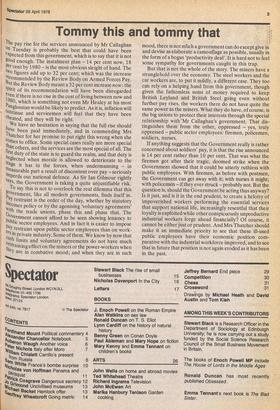Tommy this and tommy that
The pay rise for the services announced by Mr Callaghan Ott Tuesday is probably the best that could have been expected from this government, which is to say that it is not
, good enough. The instalment plan — 14 per cent now, 18 Per cent by 1980 — is the most obvious sleight of hand. The
hvo figures add up to 32 per cent; which was the increase hrecommended by the Review Body on Armed Forces Pay. °Ilt the Review Body meant a 32 per cent increase now: the skit of its recommendation will have been disregarded
even if there is no rise in the cost of living between now and h1980, which is something not even Mr Healey at his most rallglossian would be likely to predict. As it is, inflation will , continue and servicemen will feel that they have been Cheated, and they will be right. We have no hesitation in saying that the full rise should have been paid immediately, and in commending Mrs Thatcher for her promise to put right this wrong when she conies to office. Some special cases really are more special than others, and the services are the most special of all. The ftrst duty of the state is to guard the realm, and that duty is neglected when morale is allowed to deteriorate to the stage it has in the forces, when undermanning — in nteasurable part a result of discontent over pay — seriously naperils our national defence. As Sir Ian Gilmour rightly SaYs, the Government is taking a quite unjustifiable risk. ' To say this is not to overlook the real dilemma that this .,overnment, like all modern governments, finds itself in. R:ay restraint is the order of the day, whether by statutory InFornes policy or by the agonising 'voluntary agreements' w_ith the trade unions, phase this and phase that. The uovernment cannot afford to be seen showing leniency to Public sector employees. And in fact it is easier to impose PaY. restraint upon public sector employees than on workin private industry. Some of them. We know by now that ash limits and voluntary agreements do not have much ikeatraining effect on the miners or the power-workers when "eY are in combative mood; and when they are in such %ear
mood, there is not mtich a government can do except give in and devise as elaborate a camouflage as possible, usually in the form of a bogus 'productivity deal'. It is hard not to feel some sympathy for governments caught in this trap. But that is not the whole of the story. The miners have a stranglehold over the economy. The steel workers and the car workers are, to put it mildly, a different case. They too can rely on a helping hand from this government, though given the fathomless sums of money required to keep British Leyland and British Steel going even without further pay rises, the workers there do not have quite the same power as the miners. What they do have, of course, is
the big unions to protect their interests through the special relationship with 'Mr Callaghan's government. That distinguishes them from the other, oppressed — yes, truly oppressed — public sector employees: firemen, policemen, soldiers, nurses.
If anything suggests that the Government really is rather concerned about soldiers' pay, it is that the rise announced is 14 per cent rather than 10 per cent. That was what the firemen got after their tragic, doomed strike when the Government showed that it could be utterly ruthless with public employees. With firemen, as before with postmen, the Government can get away with it; with nurses it might; with policemen — if they ever struck — probably not. But tpe question is, should the Government be acting thus anyway? Is it just, and is it in the end prudent, to create a helotry of impoverished workers performing the essential services that support national life, increasingly resentful that their loyalty is exploited while other conspicuously unproductive industrial workers forge ahead financially? Of course, it
cannot be either just or prudent. And Mrs Thatcher should make it an immediate priority to see that these ill-used public employees have their economic position comparative with the industrial workforce improved, and to see that in future that position is not again eroded as it has been in the past.


































 Previous page
Previous page